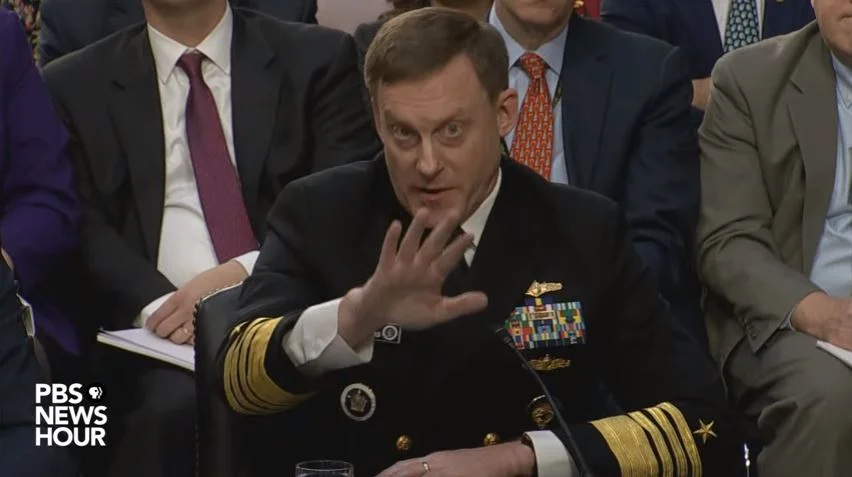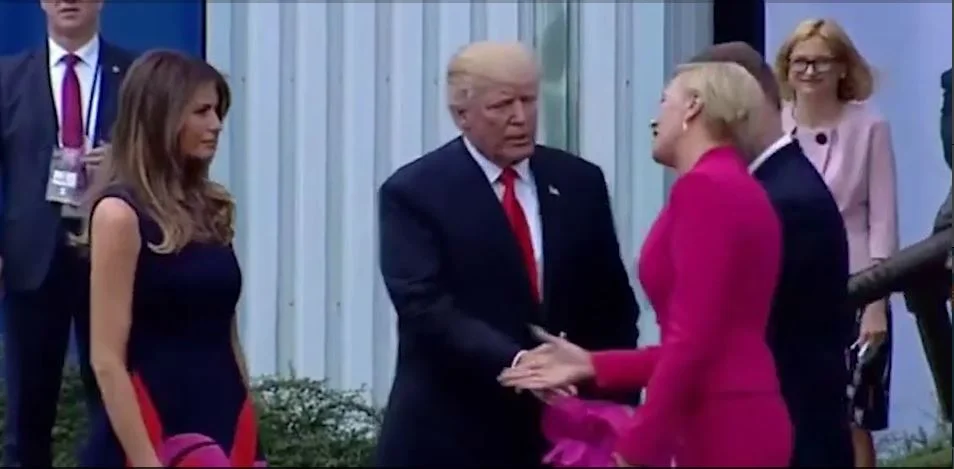Intel chiefs refute reports of pressure to intervene
Rogers and Coats state they were never pressured to act inappropriately, but most media focus on refusal to give details
MEDIA CRITIQUE
By Tatiana Prophet
The burden of proof in the current climate of Washington, D.C., appears to be on those accused by anonymous sources.
"Coats and Rogers refuse to say if Trump asked them to sway Russia probe," wrote Politico.
"Coats, Rogers Refuse to Discuss Trump Requests on Comey, Russia," wrote U.S. News.
"Intelligence Officials Sidestep Senate Questions on Trump and Russia," wrote The New York Times.
Witness the headlines after Director of National Intelligence Dan Coats and National Security Agency Director Admiral Mike Rogers answered questions regarding an anonymously sourced Washington Post article stating that President Donald Trump had contacted them to minimize or lay off the investigation into collusion between his presidential campaign and the Russian government with respect to the 2016 election.
The bias is unmistakable here. Remember on May 3, when James Comey testified before the Senate Judiciary Committee? He refused to answer literally dozens of questions about investigations into Senator Clinton as well as the Russia investigation. Was that the substantive takeaway from the event? No, it was that Comey had felt "mildly nauseous" that he may have affected the Presidential election. And that was after saying he would make his revelation about the Anthony Weiner laptop, and not about any investigation into Russian interference in the election, all over again.
There was barely a notation made of how many times Comey refused to answer a question, on account of the information being classified. In fact, he gave the same response as Dan Coats, that it would be inappropriate to share classified material as discussed with the President in a public setting.
Yet the burden of proof appears to remain with these gentlemen in this case, to refute the anonymously sourced Washington Post story. And given that they backed up their boss, but refused to provide details in a public setting, is it possible the reasons for their actions are more nuanced than most of the reports are leading us to believe? The nature of that nuance, none of us knows right now, but a large portion of the media seems to be in black-and-white mode, as in -- they're hiding something, Trump's hiding something, we know he's obstructing justice, now they're refusing to answer the question. The current atmosphere is literally so toxic that it's causing good people to lose their center.
In the interest of balance, here is the raw testimony, both transcribed and on video.
“In the three plus years that I have been the director of the NSA, to the best of my recollection, I have never been directed to do anything I believed to be illegal, immoral, unethical or inappropriate, and to the best of my recollection, during that same period of service, I do not recall ever feeling pressured to do so.”
Here's what was said in the exchange between Sen. Mark Warner (D-Va.) and the intelligence directors:
Mark Warner: We all know now that in March then-director Comey testified about the existence of an ongoing FBI investigation into links between the Trump campaign and the Russian government. And there are reports out in the press that the president separately appealed to you, Admiral Rogers, and to you, Director Coats, to downplay the investigation. And now we’ve got additional reports, and we want to give you a chance to confirm or deny these, that the president separately addressed you, Director Coats, and asked you to in effect intervene with Director Comey again, to downplay the FBI investigation. Admiral Rogers, you draw the short straw, I’m going to start with you.
Before we get to the substance of whether this call or request was made: You’ve had a very distinguished career, close to 40 years. In your experience, would it be any way typical for a president to ask questions or bring up an ongoing FBI investigation, particularly if that investigation concerns associates and individuals that might be associated with the president’s campaign or his activities?
Admiral Rogers:
Today I am not going to talk about theoreticals, I am not going to discuss the specifics of any interaction or conversations I may or may not have – if I could finish sir please – that I may or not have had with the President of the United States. But I will make the following comment: In the three plus years that I have been the director of the NSA, to the best of my recollection, I have never been directed to do anything I believed to be illegal, immoral, unethical or inappropriate, and to the best of my recollection, during that same period of service, I do not recall ever feeling pressured to do so.
Warner: But… in your course prior to the incident… was it any regular course that a president would have asked you to discuss an ongoing FBI--
Rogers: I’m not going to talk about theoreticals today.
Warner: I’m going to ask you specifically, the reports that are out there…ask you in any way shape or form to back off or downplay the Russia investigation?
Rogers: I’m not going to discuss specifics of a conversation with the President of the United States, but I stand by the comment I just made to you, sir.”
Warner: Do you feel that those conversations were classified? We know that there was an ongoing FBI investigation… press reports.
Rogers: Yes. Yes, sir.
Warner: I understand your answer, I’m disappointed with your answer… We have facts that there were other individuals that were aware of the call that was made to you, aware of the substance of that call, and that there was a memo prepared because of concerns about that call..
Rogers: I stand by the comments I have made to you today, sir. (2x)
Warner: I think it would be essential, Mr. Chairman that another individual who has served our country with great distinction.. would have the chance to relay those facts… I hope you’ll also understand the enormous need for the American public to know. ...
Director Coats – when you appeared before SSCE, you said – I will certainly tell you what I know and what I don’t know. You said that you would cooperate with this committee in any aspects related to the Russia investigation. We have press reports of not once but twice that the President of the United States asked you to either downplay the Russia investigation or to directly intervene with Director Comey. Can you set the record straight about what happened or didn’t happen?
Coats: Well Senator, as I responded to a similar question during my confirmation and in a second hearing before the committee, I do not feel it’s appropriate for me in a public session in which confidential conversations between the president and myself, I don’t feel it’s appropriate to address that in a public setting.
...
Well I stand by my previous statement that we are in a public session here, and I do not feel that it’s appropriate for me to address confidential information. Most of the information I’ve shared with the president obviously is directed toward intelligence matters during our oval briefings every morning at the White House or most mornings when he and I are in town. But for intelligence-related matters or any other matters that have been discussed, it’s my belief that it’s inappropriate for me to share that with the public.
Warner: Gentlemen, I respect all of your service, and I understand and respect … we will have to bring forward that other individual about whether the existence of the memo may document some of the facts… conversation that took place between the president and Admiral Rogers. This will be my final comment, Mr Chairman –that we also have to weigh the public’s absolute need to know. They’re wondering what’s going on. They’re wondering what type of activities. We see this pattern that without confirmation or denial, it appears that the President, not once, not twice, but we will hear from Dir Comey tomorrow, this pattern where the president seems to wants to interfere, downplay or halt not only the investigation that the DOJ is taking on, but this committee is taking on, and I hope that as we move forward on this, you’ll realize the importance that the American public deserves tot get the answers to these questions.
“Yesterday when I was asked to respond to a piece that I was told was going to be written and printed in the Washington Post this morning, my response to that was that in my time of service in interacting with the POTUS or anybody in his administration, I have never been pressured, I have never felt pressured, to intervene or interfere in any way with shaping intelligence in a political way, or in relationship to an ongoing investigation.”
Coats: Well Senator, I would like to respond to that if I could. First of all, I told you and I committed to the committee that I would be available to testify before the committee. I don’t think this is the appropriate venue to do this in, given that this is an open hearing and a lot of confidential information relative to intelligence and other matters… Second, yesterday when I was asked to respond to a piece that I was told was going to be written and printed in the Washington Post this morning, my response to that was that in my time of service in interacting with the POTUS or anybody in his administration, I have never been pressured, I have never felt pressured, to intervene or interfere in any way with shaping intelligence in a political way, or in relationship to an ongoing investigation.
Warner: All I’d say Director Coats is there was a chance here to lay to rest some of these press reports, if the president is asking you to lay to rest or downplay, you may not have felt pressure, but if he was even asking, to me that is a very relevant piece of information. And again at least in terms of the conversation with Adm Rogers, we will at some point get another individual’s version…
Sen. Jim Risch (R-Idaho): With all due respect to my colleague from Virginia, I think you have cleared up substantially your direct testimony that you have never been pressured by anyone, including the POTUS, to do something illegal, immoral or anything else. Thank you for that. Let’s go back to section 702, which is what this hearing was supposed to be all about.
-- Transcribed by Back to Facts



